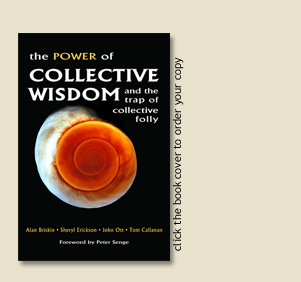Mindfulness Practice
We saw in Tom Hurley’s description of the Northwest Atlantic Marine
Alliance the creation of space for awakening curiosity in the “other”
and allowing new agreements to become possible. We saw, particularly
in the ways that polarization and false agreements have led to tragedy,
the dangers of collapsing the space for inquiry. In the last decade,
we have witnessed an explosion of group methodologies and processes
that seek to make visible the “wisdom” that is among us and coming
through us. These methodologies include various forms of dialogue;
organizational interventions such as Appreciative Inquiry and stakeholder
engagement; and avenues through which groups can catalyze new insights,
such as those developed by our colleagues Juanita Brown and David
Isaacs in the format of the World Café.
Fundamental to all these group methodologies is a
response to the need to be understood. Anyone who has worked with
children knows how deeply rooted this human impulse is. It goes beyond
individual temperament or mood. Being understood is akin to experiencing
love, and being mindful of this need for understanding brings our
attention automatically to how we impact others. Actions as simple
as spending an extra moment greeting others and showing our regard
for them create the conditions in which they can feel safe and more
open to exploration.
pdf of the full text, including full set of Practices |









